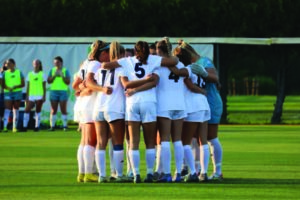Over the past week, National Education Secretary Betsy DeVos has become the center of attention, garnering scrutiny after her proposed cuts to the federal budget. DeVos appeared in front of a House Appropriations Committee at a subcommittee hearing this past week to defend the Department of Education’s budget requests for 2020, following up on President Donald Trump’s full budget request which had been released almost a month ago.
Stating in defense of the funding cut DeVos stated that the organization had “achieved their original purpose, duplicate other programs, [is] narrowly focused, or [is] unable to demonstrate effectiveness.” DeVos proposed cutting almost $18 million in funding for the Special Olympics. The Special Olympics foundation is just one of 29 other programs that have suffered from cuts imposed on the Department of Education. The department is struggling with a 10 percent decrease in funding from last year after losing about $7 billion from the federal budget in favor of military funding.
Many critics voiced their concern towards DeVos’ budget plan, asking her to clarify her feelings towards the Special Olympics program and its constituents. In a statement made Wednesday, DeVos defended her actions regarding the Special Olympics, saying, “It’s a private organization. I love its work, and I have personally supported its mission. Because of its important work, it is able to raise more than $100 million every year.”
However, many people feel as though what DeVos is saying doesn’t match up with the feeling they get from her political agenda. DeVos’s proposed cuts would mean “closing down what we are doing in schools to help end social isolation,” commented Timothy Shriver, the chairman of the Special Olympics committee, for children with disabilities. Shriver also stressed the importance of having federal support for the Special Olympics program, as “we are actively engaged in the education purposes that the country has articulated at the federal level.”
DeVos continued to defend her choice to defund the Special Olympics for three days, until Thursday morning when Trump publicly announced that he was overriding the proposed budget cuts.
“The Special Olympics will be funded. I just told my people, I want to fund the Special Olympics and I just authorized a funding of the Special Olympics. I’ve been to the Special Olympics. I think it’s incredible and I just authorized a funding. I heard about it this morning. I have overridden my people,” Trump said.
After Trump released this statement to the press, DeVos quickly recanted her prior bid to eliminate the Special Olympics funding from the budget, telling the press, “I am pleased and grateful the president and I see eye-to-eye on this issue and that he has decided to fund our Special Olympics grant. This is funding I have fought for behind the scenes over the last several years.”
Later that day, the Special Olympics committee released a statement thanking Trump for his support, commending Trump for “joining a long history of over 50 years of United States presidents and members of Congress on both sides of the aisle in their support of Special Olympics and the work we do in communities throughout the country.”
Although the White House can make suggestions to the budget proposals, the power of the executive branch to influence the budget stops there. The House of Representatives is the final step for approving the budget for the year, and it is unlikely that a large cut to the Special Olympics would actually be approved, as the House has rejected proposed cuts to the program for the last two years.
The Special Olympics helps to integrate people with disabilities in an empowering way that allows them to fully interact with the sports world. The Special Olympics program works in public schools to combat bullying and ostracism that many people become the target of due to their disabilities. It also allows athletes to connect with a variety of groups from professional and non-professional athletes to disabled athletes in order to help them succeed. These programs have reached around 272,000 people around the United States and, with federal support, the program seeks to reach out to thousands more in the future.






